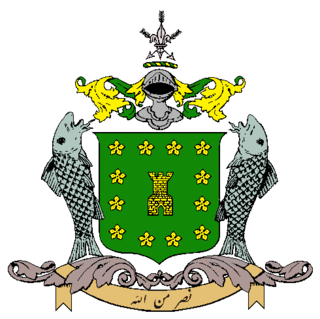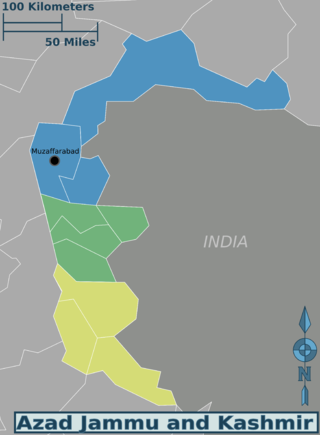Activism, 1947–1959

Nasim Shahnawaz married Colonel Akbar Khan, who became a decorated war hero in World War II. [4] Nasim is often described as ambitious and well-connected, and having been a significant influence on Akbar Khan's activities. [5] [6] [7]
Her activism came to the fore soon after the Partition of India, during the Kashmir conflict. [7] Akbar Khan, who was apparently part of a plan to capture Kashmir by invasion, [8] [9] wondered how to influence Pakistan's political leadership to back it. [10] Soon he came in contact with Mian Iftikharuddin, a leader of the Muslim League in Punjab and a cousin of Nasim, [7] [11] and Sardar Ibrahim Khan, an activist of Kashmir's Muslim Conference who was looking to launch a rebellion against the Maharaja of Kashmir and seeking Pakistan's help. [12] In a 12 September planning meeting with the prime minister Liaquat Ali Khan, both Iftikharuddin and Akbar Khan participated.
After this meeting, Akbar Khan was barred from participating in Pakistan's covert action, but Nasim seems to have been closely involved. [13] She attended a meeting in Murree towards the end of September, where Khurshid Anwar briefed the Muslim Conference activists about the invasion plan. [14] [15] [7] On 23 October, the day after the tribal invasion was launched, she and the Commissioner of Rawalpindi Division, Khawaja Abdur Rahim, went to announce to Sardar Ibrahim that he was to be the President of the Azad Kashmir provisional government. During the evidence presented to a tribunal later in the 1950s, a witness mentioned that she and her sister (Mumtaz Shahnawaz) appeared to have "sponsored" Sardar Ibrahim to be the leader. [16] [lower-alpha 1]
After the first phase of the invasion, Akbar Khan was given the charge of commanding the invasion. He assumed the nom de guerre of 'General Tariq' and moved to Murree, where he lived with Nasim and established his operational headquarters. When Captain Wajahat Hussain visited the couple on one occasion, he found Akbar Khan talking in even tones, but Nasim is said to have loudly complained about lack of support from the government and the Army headquarters. [7]
After this assignment, Akbar Khan was sent to command the Kohat Brigade. The Kashmir War ended in a ceasefire on 1 January 1949. It is said that Nasim and Akbar Khan entertained lavishly in Kohat, inviting other military officers, and discussing world politics and government inefficiency. Akbar Khan is said to have openly canvassed for a military dictatorship. [17] Nasim brought to the table her leftist and communist contacts, including Faiz Ahmad Faiz, who was said to be close a friend. [18] The government was on to them before long, and a special Deputy Inspector General of police was assigned specifically to investigate the interactions between Faiz and Nasim. [19]
By 1951, Akbar Khan was promoted to Major General, and appointed as the Chief of General Staff. It is said that the new commander-in-chief, General Ayub Khan, kept him in the General Headquarters in order to monitor his activities. [4] Between 9 and 10 March, Nasim and Akbar Khan, Faiz and several other army officers deemed to have been part of the conspiracy were arrested. [19] A Special Tribunal conducted trials for what came to be known as the Rawalpindi Conspiracy Case, and delivered a verdict in January 1953. Nasim Akbar Khan was acquitted but Akbar Khan received a twelve-year prison sentence. [19]
Akbar Khan and Nasim were divorced in 1959. [6] Afterwards, Nasim took "Jahan" as her last name.








